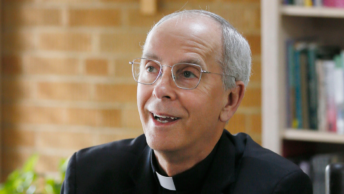During World War II the U.S. 8th Air Force attacked Nazi Germany by day, and the British Royal Air Force pounded German cities at night. The Allies gradually gained the upper hand, despite fierce resistance from the German air force, and thousands of men on both sides were seriously injured or killed in combat. In 1943, a few days before Christmas, over 400 bombers left England to bomb a factory near the German city of Bremen. Near the target an American B-17 bomber piloted by Lieutenant Charles Brown from Oklahoma was severely damaged, with four men of the ten-man crew gravely injured. After managing to release its bombs over the target, Lieutenant Brown turned the plane around and started back toward England. However, additional fighter attacks caused further damage, and also destroyed the plane’s oxygen supply. Flying at 20,000 feet without oxygen, the pilot, co-pilot, and the rest of the crew quickly passed out, and the airplane plummeted to the earth four miles below, apparently headed toward destruction. However, below 10,000 feet, the air once again became breathable, and when Lieutenant Brown regained consciousness, he saw what was happening, wrestled with the controls, and finally leveled off the plane, while over the intercom there were sounds of crew members screaming or praying. Miraculously, the B-17 was flying level once again, just a few hundred feet above the ground—but there was a problem. Disoriented, and with his navigation instruments destroyed, Lieutenant Brown turned in what he assumed was the right direction, but was actually heading deeper into Germany.
The stricken airplane was noticed by a German Bf 109 fighter pilot, Franz Steigler. He closed in to finish it off, though upon seeing the severe damage to the plane, was amazed it was able to fly at all. The crippled plane’s guns were unmanned, as the crew members were desperately caring for their injured comrades. Something caused Leutnant Steigler to withhold his fire; instead, he flew alongside the cockpit and signaled to Lieutenant Brown to lower his landing gear, land on a nearby airfield, and surrender—but the American was too groggy to understand. Finally, in exasperation, the German motioned that the American was flying in the wrong direction and needed to turn around and follow him. His German fighter then escorted the crippled American B-17 all the way to the North Sea, across which lay the safety of England. The German pilot saluted Lieutenant Brown before turning back toward Germany. Seven of the ten Americans in the shot-up plane survived the war thanks to the German fighter pilot’s compassion. Five decades later, after many years of searching, Charles Brown finally located Franz Steigler, who was by then living in Canada, and in the reunion that followed, learned that prior to the war, the German pilot had been studying to become a Catholic monk before being drafted into the German air force (Charles W. Sasser, God In the Foxhole, pp. 80- 84). Franz Steigler had been unable to pursue his original plan of serving God in a monastery, but he nonetheless put his faith into practice in a heroic and unexpected way during a very dangerous and destructive conflict. We can’t always control or arrange the circumstances of our lives, but we can be sure the Lord will always provide us with opportunities to serve Him—most especially by showing compassion to others in need.
Sometimes we human beings like to complicate things, as was the case with the scholar of the law who questioned Jesus (Lk 10:25-37). We can think in terms of “us” versus “them,” or look for loopholes or exceptions to God’s commandments, and try to find reasons or create excuses for doing what we want, even if we suspect it’s not what the Lord asks of us. Jesus does not allow us to get away with this; He tells us that at the center of our faith and our religious practices must be a genuine love for God and our neighbor—and that our neighbor is to be identified as anyone in need. As Moses states (Dt 30:10-14), God’s Law is not something remote or mysterious; no, it is very near to us, and we have no excuses for not carrying it out. And St. Paul (Col 1:15-20) reminds us that Jesus came to reconcile and save all people by the blood of His Cross—and one of the most important signs that we accept this gift of salvation is our willingness to care for and help those who suffer.
Someone once said there are ten simple rules for combating depression or beating the blues. Rule #1: go out and do something for someone else. Rule #2: repeat rule #1 nine times (James Hewett, Illustrations Unlimited, p. 119). Many people have indeed discovered that our own burdens can become much easier to bear when, instead of focusing on ourselves, we look for opportunities to help others. This shouldn’t be our primary reason for doing good, of course, but it is true that, because the goodness of God is present throughout all His creation, our sincere efforts to assist those around us allow God to bless us in an even greater way. Jesus never said what later happened to the Good Samaritan, but we can easily imagine that God richly rewarded him for his compassion— both on earth, and especially upon his entry into eternal life.
If we want to serve God by serving others, we simply need to ask the Lord for this opportunity—and it will be provided to us. If we start each day by praying, “Dear God, please help me recognize and respond to anyone I meet today needing my assistance,” this prayer will be answered, and we will be offered a chance to make a difference— perhaps in a very dramatic way, as was the case with the German fighter pilot Franz Steigler some 70 years ago, but more likely in the routine events of daily life. We know what sorts of things worry and upset us, so we should be able to notice, recognize, and empathize with other people experiencing those same things. A smile toward someone who appears lonely, a friendly word toward a person who looks upset, and a helping hand offered to somebody who seems to be struggling, can all make a difference; our efforts to reach out in a loving and caring way toward those who suffer can make it easier for them to believe in, and entrust themselves to, the mercy and love of their Father in Heaven.
When the scholar of the law asked Jesus “Who is my neighbor?,” Our Lord didn’t give an abstract or philosophical answer; instead, He responded with an easy-to-understand, down-to-earth story. In the same way, our response to God’s love isn’t supposed to be theoretical or remote; Jesus wants us to make it real and immediate by responding in practical and caring ways to anyone who has need of our compassion.








